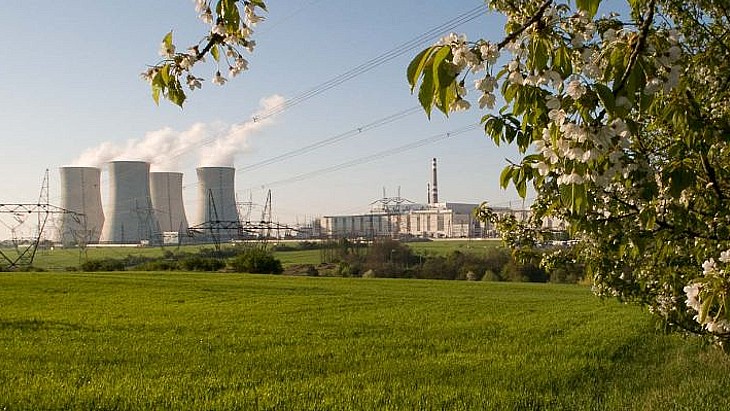The tender for new nuclear was originally for a binding offer for one new unit at Dukovany and non-binding offers for up to three more - another one at Dukovany and two at Temelín. But in February the Czech government announced it was changing the tender to binding offers for up to four new units, citing the cost savings per unit if they were not procured on a unit-by-unit basis. A third bidder, Westinghouse, did not go further in the process.
EDF was proposing its EPR1200 reactor, KHNP proposed its APR1000, with both companies stressing their agreements with Czech suppliers to localise work if selected as preferred bidder.
Czech Republic Prime Minister Petr Fiala announced the decision at a press conference, and posted a message on Facebook saying: "Contract negotiations will begin with the Korean company KHNP, which, based on the evaluation of experts, offered better conditions in most of the evaluated criteria, including the price."
The estimated cost of the new units
The evaluation was led by the team from Elektrárna Dukovany II with 206 evaluators and experts not only from EDUII, but also from the ČEZ Group and consulting companies, assessing the offers.
Overall, the documentation associated with the bids totalled approximately 200,000 pages of documents and the amount of time spent evaluating bids reached approximately 900 man-months. The contracting authority sent approximately 2700 questions to individual applicants and received answers to all of them.
The Czech government said the two bids were compared on a range of criteria including price per megawatt-hour produced. It said that if two units were contracted, the KHNP bid was for a cost of around CZK200 billion per unit (USD8.6 billion).
The winning bidder's reaction
In a statement issued to World Nuclear News following the announcement, KHNP's CEO Jooho Whang said: "I believe the primary reason the Czech government selected KHNP as the preferred bidder is because they recognised KHNP’s excellence in project management and construction capabilities, demonstrated by construction of 36 Korean nuclear reactors at home and abroad.
"Following KHNP’s successful project in the UAE, I expect that KHNP will play a pivotal role not only for Korea but globally in achieving energy security and carbon neutrality by constructing Korean nuclear reactors in the Czech Republic. A nuclear project involves long-term cooperation spanning approximately 100 years, covering construction through to operation. KHNP aims to solidify a 100-year friendship between the Czech Republic and Korea by constructing an APR1000 nuclear power plant. We will remain dedicated and exert our utmost efforts until the closing moments as we approach the upcoming negotiations with the project owner to ensure that the APR1000 reactor is built in the country."
What the Czech government has said
Fiala said: "Our goal was to come up with a solution that would be economically rational and ensure enough energy at an acceptable price. The offer of the Korean company KHNP meets these parameters. At the same time, it will bring a significant impetus to the development of the Czech economy thanks to the involvement of Czech industry to the extent of approximately 60%."
Minister of Industry and Trade Jozef Síkela said "it is clear that the preferred bidder offered a better price and more reliable guarantees of cost control, as well as the schedule of the entire project", adding "nuclear now provides us with more than a third of our electricity consumption, and in the future it should be around half. That is why its development is absolutely essential for us. At the same time, the variant of building two blocks in one location will ensure that many works will not have to be carried out twice, and will allow economies of scale to be used, thus leading to a significant reduction in costs. Specifically, about 20% per block. That's why we chose this option. It will be possible to decide on the possible use of the option for the construction of two more blocks, among other things, in connection with the development of the Czech energy industry."
CEO and Chairman of nuclear operator ČEZ, Daniel Beneš, said: "We have a clearly defined schedule, which provides for a fixed date for the start and completion of construction, and it is important for us that the selected contractor commits to it under the threat of sanctions. The offer of the preferred bidder was more satisfactory in this respect.'
The background
The Czech Republic currently gets about one-third of its electricity from the four VVER-440 units at Dukovany, which began operating between 1985 and 1987, and the two VVER-1000 units in operation at Temelín, which came into operation in 2000 and 2002.
What next?
The government has said its aim is for the contracts for the initial unit(s) to be finalised this year and signed by the end of March 2025. The target for test operation of the first new unit is 2036 with commercial operation in 2038.
Westinghouse 'reserves right to challenge decision'
Following the announcement Westinghouse issued a statement saying it reaffirmed its view that "KHNP is not authorised to use Westinghouse reactor technology... without Westinghouse’s agreement". It says KHNP has failed to comply with US export control rules, which it says require "authorisation from the US government before sharing technology beyond the agreed to Korea transfer" which is at the heart of on-going legal action in the USA involving the two companies. Westinghouse added that it "reserves its rights to challenge this in front of the relevant national and international jurisdictions".





_55401.png)
_23009.jpg)

_33392.jpg)






